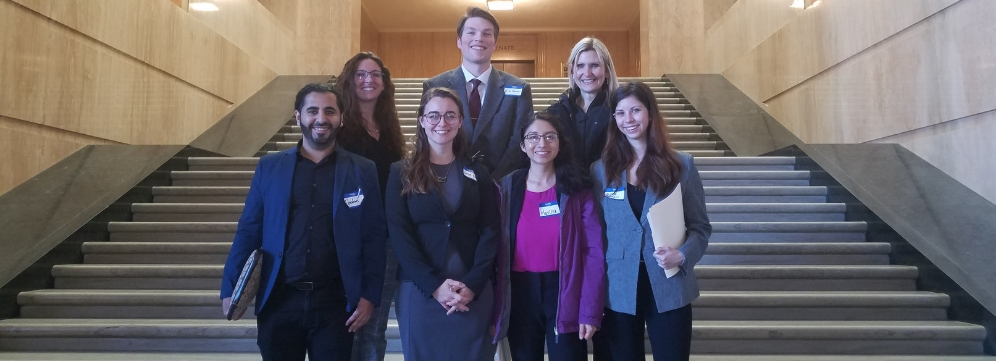
Instead of sitting through a day of lectures, five public health undergraduate students trekked to the Oregon State Capitol for the Oregon Public Health Association’s (OPHA) Advocacy Day.
Greg Desmond, a health management and policy student and president of the OSU Public Health Club, planned the event. He says having the opportunity to organize the capitol visit was one of the main reasons he wanted to be president of the student-run club. “I thought it would be a great opportunity to gain some advocacy and professional experience,” he says.
The OPHA Advocacy Day provides advocacy training and the opportunity to meet with professionals and legislators to discuss policies that promote public health.
“Our students and faculty were split into two different groups, which included other public health professionals and students from the area,” says Aimee Snyder, instructor and faculty advisor of the club.
One group met with State Rep. Dan Rayfield’s Legislative Director and Master of Public Health alum Tony Lapiz, and the other met with State Sen. Sara Gelser. In their meetings, students and faculty asked legislators to support specific bills and gave personal reasons for their request.
The bills addressed:
- Funding for public health modernization to improve integration of the state’s public health systems with the community and to ensure that all areas of Oregon are provided with the 10 essential public health services.
- Translation requirements for prescription labels to ensure safe medication usage for individuals who read a language other than English.
- Gun safety measures to prevent unsafe firearm access to children and individuals who may harm themselves.
One bill at a time
Greg, a senior who plans to pursue a career in environmental health, chose to advocate for public health modernization.
“Advocating for a hefty $47.7 million to be allocated for state, local and tribal public health authorities to fight communicable diseases, environmental health threats and much more was no easy task,” he says. “I would really like to see that money used to address contaminated drinking water systems.”
Karina Ruiz Lopez, a third-year public health major, says she advocated for pharmacies to incorporate a software system that will allow prescription instructions to be translated into a preferred language for the patient.
“I have memories of translating medical instructions from Spanish to English for my parents,” Karina says. “Considering the huge Latinx population and the growth of diverse groups in this country, it’s important to create an effective communication system between the health care industry and patients for the health and well-being of each individual.”
The future is bright
Aimee says students were encouraged by the event. “They learned their legislators were more personable and accessible than they previously thought,” she says. “One student said she now has more hope for democracy.”
Karina says being able to speak directly with legislators made her realize the importance of voicing her opinions and concerns. “It created a deeper sense of social responsibility and awareness for the opportunities I can be a part of as a student and future professional in the public health field.”
“We’re constantly told that young people in this country aren’t politically engaged,” Greg says. “It’s nice to use this trip as an example to prove them wrong.”
The CPHHS School of Social and Behavioral Health Sciences and the OPHA Health Education and Promotion Section provided financial support to reduce students’ transportation barriers.